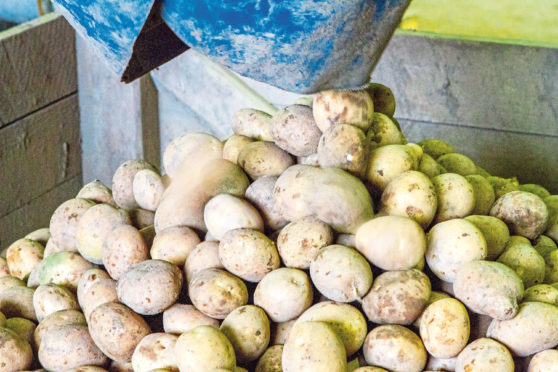As tattie growers cast their votes in the poll to decide the future of the AHDB levy, one prominent UK vegetable producer has accused the quango of “Putinesque” tactics and casting doubt on the horticulture sector’s ballot result which was announced earlier this week.
Rodger Hobson, the chairman of the British Carrot Growers Association, said the industry’s resounding vote against a horticulture levy was achieved despite the odds being stacked against it.
He also criticised AHDB’s chairman Nicholas Saphir’s interpretation of the result.
He said: “By re-weighting the votes (by levy contribution and amalgamated across sectors), they (said they) could prove the opposite result.”
Mr Hobson complained the industry had witnessed a “bizarre” one-sided AHDB horticulture ballot campaign with double-page adverts backing “yes” in all the trade press, together with direct mailshots to all voters about why they should vote “yes” and town hall meetings to endorse “yes”.
He added: “This Putinesque media campaign was paid for by our own levy contributions!”
In response, AHDB chairman Nicholas Saphir said the total external costs of organising the horticulture and potato ballots were just under £60,000, and worked out at around £16 per levy payer voter.
He added that Defra had requested the breakdown and analysis of the horticulture ballot, and reiterated that it showed a “complex picture”.
The row is casting a shadow over the potato levy ballot which is now open and runs until mid-March.
Most growers and potato businesses are reluctant to be quoted on their voting intentions, but there is deep-rooted criticism in the industry that too much of the levy is spent on running the organisation.
David Stewart, a seed potato producer from Perth, said he knew of no growers who believed the levy delivered value for money.
He added: “The only value from AHDB is where they fund private agronomists like Scottish Agronomy or SRUC to do research.
“If in future we don’t have to pay £42/ha in levy, then organisations like that would be in a strong position to come to farmers and offer to do trials, and I think most farmers would be prepared to pay for that type of targeted research.
“I believe it’s important to spend a reasonable amount on research and development, but I like to have one-to-one conversations about the research, which is best done in smaller, focused groups.”
